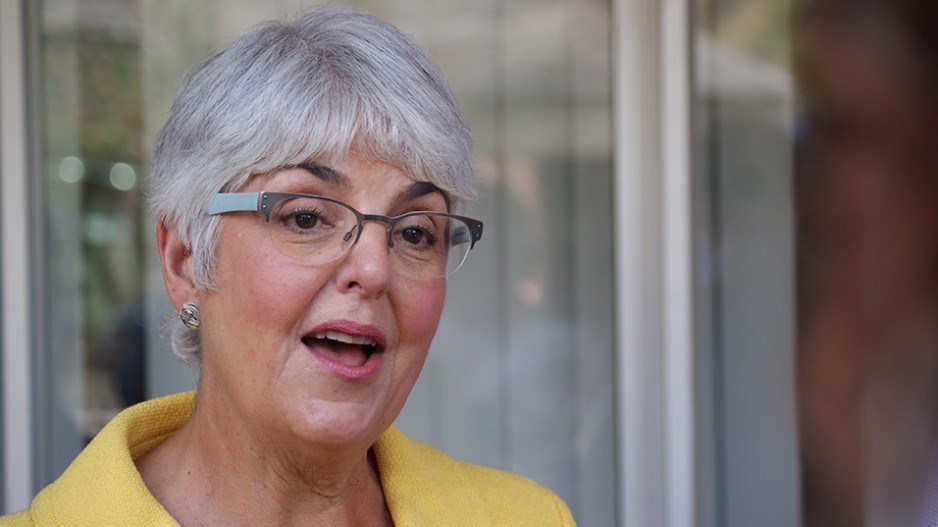B.C.’s speculation tax is increasing housing stock and generating revenue for housing creation, Finance Minister Carole James said Sept. 12.
The tax was created to address the ongoing affordability crisis in the province’s major urban centres where real estate has been subject to speculation and allegedly used for laundering illegal funds.
“When we formed government two years ago, we really were at the peak of a housing crisis,” James said. “The tax is working as we intended.”
Critics, however, want to see more data and question James’ claims that the results have been positive.
The NDP government announced the tax last year to free up rental properties and to put a greater tax burden on those who use social welfare systems but do not pay much income tax.
The minister said 99.8% of British Columbians are exempt from the tax. And, more than 1.6 million declarations were completed by British Columbians as it was initiated.
Those affected by it (and the taxes assessed) are in the Victoria ($3,743,000), Central Okanagan ($2,964,000), Fraser Valley ($661,000), Metro Vancouver ($50,084,000) and Nanaimo areas ($621,000).
The average assessed home value of properties subject to the tax is $1.45 million while the average assessed value of properties exempt from the tax in the taxable areas is $1.1 million, ministry data said.
And, James warned, an audit of those exempted from the tax will ensure no one is avoiding paying their legal share.
“We said from the start we would have a strong audit process and that has begun,” James said. “Tax fraud is not something that will be supported in British Columbia.”
James said in July as she released the 2018-2019 public accounts that the tax had added $115 million to provincial coffers. Property transfer tax revenue decreased by $315 million, or 14.7% – a shift the government attributed to weaker housing sales.
James said the tax rate on foreign owners and satellite families will increase in 2019.
For 2019 and onwards, the speculation and vacancy tax rate will vary, depending on residency and where owners pay income tax. Those rates will be 2% for foreign owners and satellite families and 0.5% for British Columbians and other Canadian citizens or permanent residents who are not members of a satellite family
As of its first quarterly report, the ministry is forecasting revenue of $185 million in 2019-20 and $185 million in 2020-21.
James said there has been an 8% drop in the prices of houses, condos and townhouses but did not specify a time period and claimed a lack of background data due to previous Liberal government practices.
Her comments came as the government begins consultation with mayors and communities affected by the tax to obtain feedback on the tax to date and to get suggestions for both updates and usages for the revenue.
Spec Tax Consultation All by Emma Crawford Hampel, BIV.com on Scribd
Government data said foreign owners (4,612), satellite families (3,060) and Canadians living outside B.C. (1,519) made up make up the 11,783 homes subject to the tax.
Canadian citizens or residents – including both B.C. residents and Canadians living outside B.C. – accounted for 60% of the homes subject to the tax. Only 238 properties were classified as “other,” meaning they were held by corporations and trusts.
Property tax agent and real estate consultant Paul Sullivan said he wants data proving the tax has created new rental accommodation. He said the city has claimed the same about its empty home tax.
He said the tax has added an average $50,000 to the price of homes, increasing unaffordability.
“The principle of taxing to create affordability has been a blatant failure,” Sullivan said.
He said a combination of taxes has instead affected peoples’ equity and pension situations.
The opposition BC Liberals have panned the tax for prying into people’s private information, namely by requiring a social insurance number on declaration forms.
Neither James ministry nor the Office of the Information and Privacy Commissioner will release documents on any privacy consultations around the tax under B.C. access to information laws. James said a commissioner’s review of those concerns is ongoing.
She said her ministry is “extremely careful” in how it manages the sensitive data British Columbians share with it.
As of press time, representatives for the BC Liberal Party have not responded to a request for comment.
- More to come
@jhainswo




